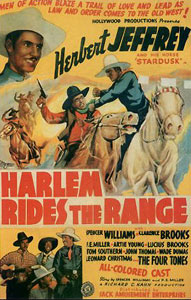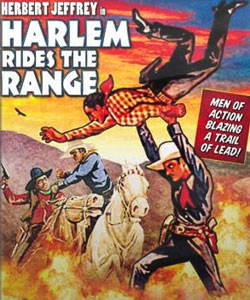 After the Civil War & the liberation of slaves, African Americans scattered across America to build lives for themselves & their families. Many went west & became professional cowboys, cattle drivers, & occasioinally even outlaws.
After the Civil War & the liberation of slaves, African Americans scattered across America to build lives for themselves & their families. Many went west & became professional cowboys, cattle drivers, & occasioinally even outlaws.
The black cowboy was not a rarity of the old west, but a commonplace; some have estimated that as many as one in four cowboys of the era were black. So movies that posit the immigrant west as lily-white perpetuate a falsehood of the gravest sort.
When Herb Jeffries was a young Chicago singer, he liked cowboy movies. One day he just said it out loud, "There were black cowboys. There ought to be black cowboy movies." He set out with every connection he could muster to bring such films into being.
In days of segregation, it wasn't easy to use the regular film ranches to make an all-black movie. Herb Jeffries' films were thus filmed at the N. B. Murray Dude Ranch, which catered to a black clientelle, & this happily meant there'd be no issues of where in a white neighborhood black actors would've eaten & slept.
The 40 acre dude ranch in Apple Valley, California, under the auspices of Nolie & Lela Murray, specialized in giving urban black youth & families the full-on western experience.
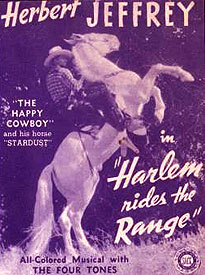 The ranch's original mission was to provide positive experiences for urban youth at risk. But when the ranch was nearly lost during the Depression, they began to go the vacation dude ranch route. Even the white folks of segregated Victorville began to love & promote what they called "the overalls dude ranch," thrilled with the tourist trade it generated & the number of big stars that came to the valley. The ranch's original mission was to provide positive experiences for urban youth at risk. But when the ranch was nearly lost during the Depression, they began to go the vacation dude ranch route. Even the white folks of segregated Victorville began to love & promote what they called "the overalls dude ranch," thrilled with the tourist trade it generated & the number of big stars that came to the valley.
It was open to everyone, not just African Americans, so mixed race families came, & regular folk hobnobbed with celebrities -- Lena Horne, Bill Bojangles Robinson, Joe Louis, Hattie McDaniels, Louise Beavers, Nina Mae McKinney, but also white supporters of equality like Kate Smith, Clark Gable, and even child star Freddie Barthelmew. The staff too was integrated, consisting of black, white, & Japanese.
So while black folk might be deprived of rightful access even to the majority of California public parks, Nolie & Lela promoted equal access for all when it was under their control. And with their new success, the Murrays were once again able to underwrite underprivileged, troubled, or handicapped kids (both black & white let it me noted) for the ranch experience. The Murrays had truly carved themselves a piece of paradise in a troubled world.
The Herb Jeffries westerns were Harlem on the Prairie (1937), Two-Gun Man From Harlem (1938), The Bronze Buckeroo (1939), & Harlem Rides the Range (1939). After this last, he had to make a career choice, either his singing or his black-cast cowboy career. As he had the opportunity to go on the road with Duke Ellington, his music took precidence. This was followed by military service then ten years spent in Europe, mainly France. So he made no more singing-cowboy movies, alas.
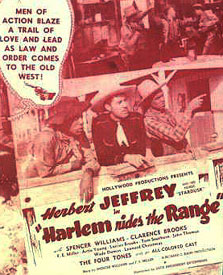 As Harlem Rides the Range opens, we hear Herb Jeffries (who has a variant screen credit as Herbert Jeffrey) singing the theme song for the series, a sweet tenor for cowboy swing: "I love to hit the leather/ In any form of weather/ And I know I'll never change/ With my boots & my saddle/ And my horse & by gun/ I'm a happy cowboy..." As Harlem Rides the Range opens, we hear Herb Jeffries (who has a variant screen credit as Herbert Jeffrey) singing the theme song for the series, a sweet tenor for cowboy swing: "I love to hit the leather/ In any form of weather/ And I know I'll never change/ With my boots & my saddle/ And my horse & by gun/ I'm a happy cowboy..."
Bob Blake (Jeffries) & his sidekick Dusty (Lucius Brooks) are riding across the countryside looking for new adventure. They stumble upon a ranch where there appears to have been a recent murder, though in fact the wounded victim of the crime, Jim Dennison (Leonard Christmas), is hiding for fear of his life & will turn up before the end.
At the ranch Bob sees a picture of the missing rancher's daughter Margaret (Artie Young). The picture induces love-at-first-sight for Bob, so he swipes the framed photo.
Bad guy Bradley (Clarence Brooks) knows there's a mine somewhere on the Dennison ranch so wants to take it over. Another rancher, Watson, is played by Spenser Williams, who co-wrote the script, & was a major figure in independent "race films," pretty much ending his career as Kingfisher on the television version of Amos & Andy (1952).
Following a pretty basic plot, Bob will save Margaret, evade an attempted frame-up for the murder of a ranch foreman (Tom Southern), overcoming all evil machinations for a romantic coda after the standard "ambush at the pass" climax.
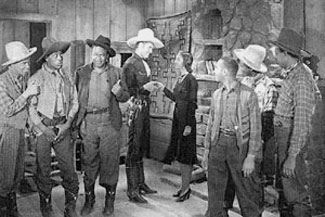 Along the way we get a lot of comedy, a bit of sharp-shooting, & a right fine musical interlude when Jeffries sings the lovely western swing song "Prairie Flower" by Lew Porter, with romantic lyrics: "The rolling tumble weeds whisper to me/ And they tell me that your heart's for me alone..." Along the way we get a lot of comedy, a bit of sharp-shooting, & a right fine musical interlude when Jeffries sings the lovely western swing song "Prairie Flower" by Lew Porter, with romantic lyrics: "The rolling tumble weeds whisper to me/ And they tell me that your heart's for me alone..."
Herb is backed by two vocal groups, the Four Tones, namely Lucius Brooks, Leon Buck, Ira Hardin & Rudolph Hunter; & the Four Blackbirds, who were Reg Anderson, Edward Brandon, James Davis & Jack Williams.
The Four Tones headed by Lucius as Dusty appeared in all the other Jeffries westerns. The Four Blackbirds sang only in the first & fourth films. They were a Harlem version of the Sons of the Pioneers.
It is only a guess that going off to World War II put an end to any possibility of a recording career, & they are not the same as the Los Angeles vocal group of the same name, that group headed up by Geraldine Harris & featured in a couple of short subjects of the 1930s, while they were recording Dixie-beat for Columbia. The western swing vocal group undoubtedly toured a bit during the '30s but have left darned little of themselves for posterity.
As B-westerns of the era go, this is as good as the majority of the white-cast examples. It does, alas, short change the audience for tunes, but we'll forgive that.
copyright © by Paghat the Ratgirl
|
